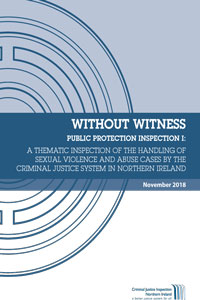A Thematic Inspection of the Handling of Sexual Violence and Abuse Cases by the Criminal Justice System in Northern Ireland
Publication: 13/11/18

“Justice system ‘struggling’ to deliver acceptable outcomes for victims of sexual offences”
The Chief Inspector of Criminal Justice in Northern Ireland has challenged criminal justice organisations to improve how they manage sexual violence and abuse crimes.
Brendan McGuigan said that the latest Criminal Justice Inspection Northern Ireland (CJI) report on how these cases were handled had found the criminal justice system was struggling to cope and did not deliver acceptable outcomes for victims.
“In Northern Ireland we have seen the reporting of sexual violence and abuse offences such as rape, sexual assault and child abuse amongst others almost triple since 2000-01. In 2016-17, over 3,150 incidents were recorded by the police which equates to nine incidents being recorded every day of the year,” said Mr McGuigan.
“Each one of these incidents represents a significant trauma for the victim and creates an expectation that for those who have chosen to report the offence, and seek a criminal justice outcome, their case will be progressed in a timely fashion. This report however has shown that this is unlikely to be the case.
“Inspectors found that while there were many dedicated and professional individuals involved in dealing with incidents of sexual violence and abuse, delay was a substantial problem. It occurred from when the initial police investigation and file preparation was undertaken, through the time taken by prosecutors to review the case and make a decision to prosecute or not, and afterwards in the number of adjournments at Court before a trial commenced,” said Mr McGuigan.
The Chief Inspector said he welcomed the work undertaken by the Police Service of Northern Ireland (PSNI) and the Public Prosecution Service for Northern Ireland (PPS) in their respective organisations, to bring together officers and prosecutors with specialist skills.
“The creation of the PSNI Public Protection Branch and the PPS Serious Crime Unit has strengthened relationships between the PSNI and PPS and with their voluntary sector partners. But from the outset, their ability to deliver improved outcomes and reduce delay has been hampered by challenges around securing sufficient staff and managing their ever increasing workload,” said Mr McGuigan.
Inspectors who undertook a case file review within the PSNI found that the delay in taking a statement or arranging an interview could contribute to the decision of the victim to withdraw from the case and ultimately, made the job of the Investigating Officer more difficult.
“Inspectors also found examples in their case file review where some PPS decisions on sexual offences exceeded one year which in our view was simply unacceptable,” stated Mr McGuigan.
The Chief Inspector said the inspection report also highlighted high levels of victim withdrawal.
“Victims who experience delay in the overall progress of their case can choose to withdraw their support for the criminal justice process. And for some, the prospect of an adversarial, highly intrusive trial where their intimate behaviours will be scrutinised and challenged, with only a very limited prospect of securing a conviction, may cause them to reconsider,” said Mr McGuigan.
The Chief Inspector indicated it was imperative a ‘prosecution team’ approach to the management of sexual violence and abuse offences be adopted from the outset. He also recommended that difficulties with each case should be identified and planned for from the start as part of the development of a strong case strategy, in order to secure the best prospect of a conviction at Court for those cases that met the evidential standards.
“Over the last 12 years CJI has published two reports on sexual violence, one on file quality and disclosure and three on avoidable delay. Through these various reports we have previously recommended that police officers and prosecutors should work more closely together and develop a ‘prosecution team’ approach. We have also urged the criminal justice system and the organisations themselves to take action to address delay and improve the timeliness of case file progression.
“But yet despite accepting our previous recommendations, impetus has been lost and the work required to bring about real change remains unfinished,” said Mr McGuigan.
“The result is that time and time again victims of sexual crime in particular are being failed, especially when despite a lengthy criminal justice process, we estimate that in Northern Ireland in 2016-17 the number of convictions for rape as a proportion of the number of rapes recorded by the police was less than 2% and for other sexual offences, the proportion was less than 10%.
While this latest inspection report includes three strategic and six operational recommendations, Mr McGuigan indicated that on their own, they would not deliver the fundamental change necessary to ensure appropriate outcomes were secured for victims of sexual crime.
“I believe there is a need for wider public debate on this issue and that this report in tandem with other work undertaken by Sir John Gillen when published, provides an opportunity to start this conversation.
“I am calling on political representatives to show leadership and I am hopeful my meeting this afternoon at Parliament Buildings with the All Party Group on Domestic and Sexual Violence will contribute to this wider debate,” he concluded.